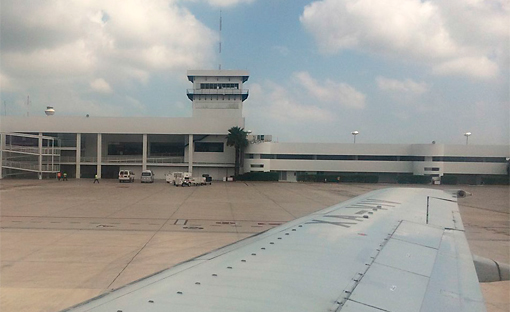| 제목 | [DAIKIN] GOVERNMENT - Cancun Airport | 작성일 | 16-06-16 14:31 |
| 글쓴이 | 최고관리자 | 조회수 | 2,813 |
본문
CASE STUDY
Airport
Name
Cancún International Airport
Location
Cancún, Mexico
Building Size
Terminal 2: 52,000 sq. meters
Terminal 3: 48,000 sq. meters
Issue
Upgrade expanding building cooling capacity with energy and cost-saving equipment
Solution
(3) Daikin Pathfinder® air cooled chillers
(6) 1000-ton Daikin Magnitude® magnetic-bearing centrifugal chillers
(44) Daikin Skyline® custom
outdoor air handlers
Cancún Airport Cooling Capacities Soar with Daikin Magnitude Chillers and Skyline Outdoor Air Handlers
Issue
Cancún, Mexico, is a thriving, global tourist destination. Cancún International Airport, a gateway to the Mexican Caribbean and the country’s second busiest airport, served nearly 17.5 million passengers in 2014 and continues to expand its infrastructure. With high volumes of tourist traffic and tropical conditions, the airport demands dependable cooling. “Air conditioning is huge here and the size of the cooling capacity needed for the airport is significant. While planning the expansion of Terminal 2 and 3, Cancún Airport also saw a need to upgrade some of its present systems,” says Eduardo Alvarez, applied sales engineer with Daikin Mexico.

Terminal 2 relies on three new Daikin Pathfinders, in addition to an existing Daikin chiller that serves as backup.
The HVAC upgrade is part of the airport’s five-year expansion plan. “The aim of changing our equipment is mainly due to two important issues for the airport: the equipment efficiency gains with reduced power consumption and achieving comfort in the shortest possible time while earning energy-efficient savings from the equipment. In other words, comfort and efficiency go hand in hand,” says Víctor S. Marino T., electrical and electromechanical engineer with Servicios Aeroportuarios del Sureste SA de CV (ASUR) in Cancún.
Cancún Airport-ASUR sought the engineering services of Iberia Renovables, a unit of the Iberia Group, which performed a comprehensive analysis of single-compressor and dual-compressor chillers from three manufacturers, each in various operating scenarios. Importantly, the analysis showed that changing to a water-cooled system from the airport’s primary use of an air-cooled system would save considerable operating costs.
Solution
Among the competition, Daikin demonstrated the most efficient, environmentally responsible solution with return on investment achieved in just over three years. “We selected Daikin which has proven to be good and reliable equipment that has provided excellent performance for more than 10 years,” Marino T. says.
“The airport had 14 existing air-cooled chillers in various tonnage capacities, but because of the efficiencies of the water-cooled Daikin Magnitude chillers, the airport decided to transition from air-cooled to water-cooled chillers,” Alvarez explains.
The existing air-cooled chillers in Terminal 2 and Terminal 3 are being replaced. The cooling and energy efficiency needs of the expanded terminals will be served by three dual-compressor Magnitude chillers, three Pathfinder air-cooled chillers, and three existing water-cooled Daikin chillers that have been in service at the airport since 2006. The expansion includes a small, recently completed addition to Terminal 2, used for domestic travel, and a large addition of 13,000 sq. meters to Terminal 3, the hub of international travel.

Six 1000-ton Magnitude chillers are among the new Daikin equipment serving the cooling needs for the airport’s expanded terminals.
In addition, of the three existing Daikin dual-compressor chillers, one will remain at Terminal 3, and two will be relocated to Terminal 4. “These conventional centrifugal units are all in very good condition and required minimal retrofit,” Alvarez says.

With substantial life still available, three existing Daikin dual-compressor chillers were relocated to extend the airport’s earlier investment in HVAC technology.
The Daikin legacy equipment includes air handling equipment at the two terminals which will remain in service. Another 44 new Skyline custom outdoor air handlers (upper right) bring the total to 120 Daikin air handlers at the sprawling airport.
The transition from an air-cooled to a primarily water-cooled facility also signals conscious conservation of water and energy. “About 50 percent of businesses here rely on well-water systems, which are preferred in our humid climate because they use less evaporation than cooling towers. That equates to cost savings,” Alvarez says. A new condenser well system was installed to supply water for the chillers, featuring a titanium condenser that is far more corrosion-resistant than copper. Also, not using cooling towers at the Cancún Airport contributes to a low-maintenance solution afforded by the new chillers.

44 new (in addition to 76 existing) Daikin Skyline outdoor air handlers provide air handling requirements for the airport’s terminals.
Outcome
The first Magnitude chiller was started up in July 2015 at Terminal 3 (below), currently under construction, with the remaining new chillers coming online through year-end. “The start-up of the new equipment went as expected,” Marino T. says. “The Daikin Magnitude is a very efficient, reliable piece of equipment with a very fast response time to reach the chilled-water setpoint.”

Expansion of Terminal 3 should contribute toward increasing annual capacity up to 10 million travelers from the current six million.
Cancún Airport-ASUR appreciates the magnetic-bearing design on the chillers which reduces maintenance requirements and saves on labor costs. Daikin Service has supported the airport’s operation as the HVAC maintenance contractor for much of the last decade and will continue to partner with the airport.
By December 2015, most of the new Daikin equipment will be in operation at Cancún Airport, concurrent with the completed expansions of Terminal 2 and 3. As the airport expands with a brand-new Terminal 4, three remaining Magnitude chillers will be placed in service (expected in 2017), along with additional Daikin equipment as that terminal is expanded. The airport expansion is projected to continue through 2025.
| 이전글 | [DAIKIN] GOVERNMENT - Auburn Memorial City Hall 2016-06-16 | ||
| 다음글 | [DAIKIN] GOVERNMENT - Dallas NWSC 2016-06-16 | ||






